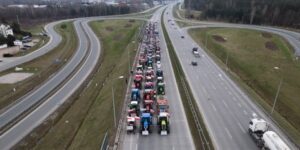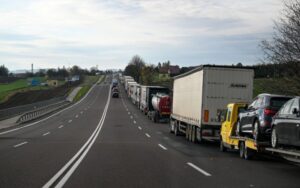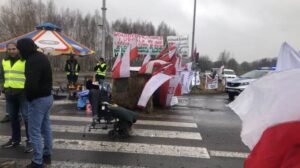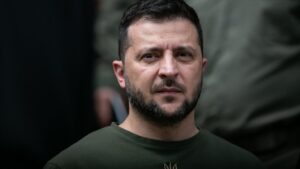
Ukrainian and Polish agrarian associations will continue negotiations this week on the transit of grain and other products and the unblocking of the border, said Taras Vysotskyi, First Deputy Minister of Agrarian Policy and Food of Ukraine, during a national telethon.
“It is very important that the associations of different sectors have established communication and will continue to meet this week to clearly agree on the parameters (of export and transit of Ukrainian agricultural products – IF-U). Everyone realized (at the Ukrainian-Polish meeting in Poland last week – IF-U) that interaction and cooperation, agreements will ultimately have the best result,” he said.
According to Vysotsky, in the first two weeks of April, a meeting of the Polish and Ukrainian sides is planned in an expanded format, where farmers of the two countries will look for ways to cooperate. It is expected that this could also become the basis for agreements at the interstate level. Agrarian associations will work on each industry whose representatives were at the talks, including raspberries, juice, honey, eggs, grain, and poultry.
“There is a cautious optimism in this regard, which gives us hope that after a few more meetings to fix the final parameters, we will finally be able to solve this problem,” Vysotsky emphasized.
He also added that the issue of transit of Ukrainian grain is raised at all international meetings.
“Ukraine insists that transit should be available without stops and blockages,” the First Deputy Minister summarized.
agrarian associations, AGRICULTURAL PRODUCTS, BORDER, TRANSIT

Polish authorities have agreed with farmers on subsidies per ton of grain and temporary closure of the border with Ukraine from April 1 for the transit of some agricultural products, polskieradio24.pl reported.
According to the newspaper, the document was signed by representatives of the protesting farmers, Agriculture Minister Czeslaw Seckerski and the ministry’s state secretary Michal Kolodziejczak.
The agreement envisages maintaining the current embargo on agricultural products from Ukraine, which has been in place since mid-September last year. It concerns in particular wheat, corn, wheat flour, rapeseed and sunflower.
In addition, the Minister of Agriculture must ask the Council of Ministers of the European Union to suspend the transit of these products through Polish territory as of April 1 this year.
Both sides in the signed document also consider it necessary to develop detailed rules for agri-food trade between Poland and Ukraine, but also note that the difficult situation in agriculture is the result of Russia’s aggression against Ukraine.
Farmers’ representatives in the agreement declare their government’s support for the changes to the Green Agreement. It is primarily about replacing the mandatory transfer to a voluntary ecosystem and simplifying other rules for farmers.
AUTHORITIES, BORDER, FARMERS, GRAIN, POLAND, transit products, UKRAINE

Polish farmers continue to block truck traffic at the Yahodyn, Ustyluh, Uhryniv, Rava-Ruska, Shehyni and Krakivets checkpoints, with a total of nearly 2,400 trucks in the queues, according to Andriy Demchenko, spokesman for the State Border Guard Service of Ukraine (SBGS).
“Polish farmers are blocking traffic in six directions. These are the directions of the Yahodyn, Ustyluh, Uhryniv, Rava-Ruska, Shehyni and Krakovets checkpoints. “If we talk about the queues that have formed in Poland because of this, in all these directions, in total, as of this morning, it is about 2,400 trucks, most of all at the Krakovets, Rava-Ruska and Yagodyn checkpoints,” Demchenko said on the air of the national telethon on Sunday.
According to him, the lowest rates of border crossings remain for trucks. Over the past day, about 90 trucks crossed the border in both directions at Shehyni checkpoint, and 50 trucks crossed the border to Ukraine at Yagodyn checkpoint, but Polish farmers continue to completely block the movement of trucks heading from Ukraine to Poland.
There is no blocking of cars and buses.

Protesting Polish farmers have begun to restrict vehicle traffic on the border with Ukraine, the State Border Guard Service of Ukraine says.
“Medica-Shegyni. Polish farmers have completely blocked truck traffic through the checkpoint. No deadline for the completion of such a blockade was announced,” the State Border Guard Service said in a statement on its Telegram channel on Tuesday.
According to the State Border Guard Service, the protesters plan to block traffic for all types of transport near the Dolhobychuv-Uhryniv checkpoint until 17.00 on February 20.
“At the Zosin-Ustyluh checkpoint, from 13:00 to 16:00, the protesters intend to restrict the movement of buses, trucks and cars in both directions. They promise to let through only trucks with humanitarian aid,” the State Border Guard Service said in a statement.
At the Korchova-Krakovets checkpoint: “Until 21.00 on February 20, the protesters plan to block the movement of trucks leaving Poland, except for those carrying critical cargo. At the same time, buses, minibuses, and cars will be able to move freely in both directions.”
According to the State Border Guard Service, at the Hrebenne-Rava-Ruska checkpoint, “protesters have completely blocked traffic in both directions for all categories of vehicles, except for those carrying critical cargo and humanitarian aid, since 13.00 on February 20.”
At the Dorohusk-Yahodyn checkpoint, the protest organizers intend to completely block truck traffic in both directions until “19.00”.

President of Ukraine Volodymyr Zelenskyy said that the situation with the blockade of the border by Polish farmers is a political one, but the parties need joint decisions and a fair way out.
“What is happening on our western border – the border with Poland – cannot be taken as something normal or ordinary. Only 5% of our agricultural exports pass through the Polish border. Therefore, in fact, the situation is not about grain, but rather about politics,” he said in an evening video address.
Thus, according to him, “compared to the news from near Kupyansk, where the enemy artillery does not stop, the news from the border with Poland looks just mocking.”
The Head of State emphasized the need to find a solution to this situation.
“We need simple and clear justice. We need joint decisions, rational decisions to get out of this situation. The decisions are ours with the Poles, first of all, and everyone in Europe who cares about the fate of Europe,” he said.
As reported, Polish farmers announced the beginning of a full blockade of the border on February 20, including the blocking of road checkpoints, railroad entrances and exits to ports.

The number of border crossings in Ukraine between December 30 and January 5 decreased by 18.4% compared to the previous week, to 475,000, and the number of vehicles let through decreased by 18.2%, to 90,000, according to the State Border Guard Service’s Facebook post.
According to the data, while the flow of people entering Ukraine had been exceeding the flow of people leaving by 22-24 thousand every week for two weeks, the situation reversed on New Year’s Eve: the number of people crossing the border decreased from 302 thousand to 224 thousand, while the number of people entering the country decreased from 280 thousand to 250 thousand.
The number of cleared vehicles with humanitarian cargo decreased to 340 from 576 a week earlier.
Compared to the situation a year ago, the inflow to Ukraine has shifted a week ahead, which may be due to the postponement of Christmas celebrations.
Statistics from the Polish Border Guard Service during the New Year’s week also show a change in dynamics after two weeks of net inflows to Ukraine: during the New Year’s week, 23.5 thousand more people leaving Ukraine than entering were recorded, with a decrease in total passenger traffic by 18.3% to 311.5 thousand. A year ago, net inflows to Ukraine across the Polish border were recorded until January 6 inclusive.
In total, from the beginning of the war to January 5, 2024, 18.27 million people arrived in Poland from Ukraine, while 16.48 million people traveled in the opposite direction.
As reported, since May 10, 2022, the outflow of refugees from Ukraine has been replaced by an influx, which lasted until September 23, 2022 and amounted to 409 thousand people.
However, since the end of September, possibly under the influence of news about mobilization in Russia and “pseudo-referendums” in the occupied territories, and then massive shelling of energy infrastructure, the number of people leaving has been exceeding the number of people entering. It temporarily stopped in the second half of December and early January during the holidays, but then resumed again and reached a total of 223 thousand people from the end of September to the anniversary of the full-scale war.
Since then, the number of border crossings to enter Ukraine has exceeded the number of crossings to leave by 64 thousand people.
As Deputy Economy Minister Serhiy Sobolev noted in early March this year, the return of every 100,000 Ukrainians home results in a 0.5% increase in GDP.
According to the UNHCR, the number of Ukrainian refugees in Europe was estimated at 5.937 million as of January 3, and 6.340 million worldwide, which is only 1-2 thousand more than a week earlier.
In Ukraine itself, according to the UN, as of November 6, there were 3.674 million internally displaced persons (IDPs), compared to the previous estimate of 5.088 million. “This (significant reduction) is not due to a significant return of IDPs, but rather, first of all, to a change in the methodology for calculating the number of IDPs. The new baseline population figure used to extrapolate IDP estimates now takes into account the absence of some 6.2 million refugees from Ukraine who are no longer in the country,” UNHCR explains.